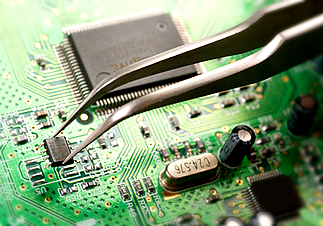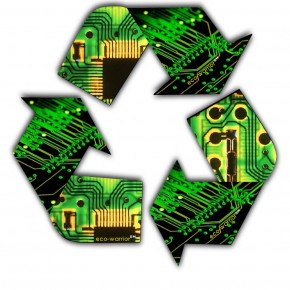- How to Adjust X and Y Axis Scale in Arduino Serial Plotter (No Extra Software Needed)Posted 3 months ago
- Elettronici Entusiasti: Inspiring Makers at Maker Faire Rome 2024Posted 3 months ago
- makeITcircular 2024 content launched – Part of Maker Faire Rome 2024Posted 6 months ago
- Application For Maker Faire Rome 2024: Deadline June 20thPosted 7 months ago
- Building a 3D Digital Clock with ArduinoPosted 12 months ago
- Creating a controller for Minecraft with realistic body movements using ArduinoPosted 1 year ago
- Snowflake with ArduinoPosted 1 year ago
- Holographic Christmas TreePosted 1 year ago
- Segstick: Build Your Own Self-Balancing Vehicle in Just 2 Days with ArduinoPosted 1 year ago
- ZSWatch: An Open-Source Smartwatch Project Based on the Zephyr Operating SystemPosted 1 year ago
PCB Recycling: The Core of Your Electronics Is More Valuable Than You Think
The screen you are looking at this very moment will someday be recycled. Electronic recycling is fast becoming just as important as plastic and steel recycling. This is because your household electronic devices – old VCRs, stereo systems, television sets and desktop computers – contain valuable metals and components that can be broken down, recycled and reused. Those dusty shelves in your garage might hold more monetary value than you’re aware of!
What are PCBs?
PCBs (or Printed Circuit Boards) are copper-coated plastic layers that connect electrical components using conducting tracks, metals and glass. To the untrained eye, it simply looks like an electronic maze on a green metal plate, but its components are quite special and usually assembled by an expert like AiPCBA. Electronic waste is made up of PCBs and various cables that require careful demanufacturing by approved recyclers so they can be used again.

Source: Wisegeek.org
Why is e-waste valuable?
Computers, microwaves, video cameras – anything that runs on electricity and contains memory chips also contains metals and elements like gold, lead, mercury, iron and cadmium. They also have plastic (the outer casing), glass and fiberglass (the monitor). A major percentage of electronic waste contains plastic, glass and metals, which can (and should) be easily extracted. All of these individual parts can be separated from the unusable elements and refined to manufacture other products.
They are valuable because obtaining these metals means that new metals don’t have to be procured by using raw materials. This e-waste fact sheet suggests that recycling 1 million laptops can save enough energy to power 3,657 U.S. homes for a year.
E-recycling is definitely something that must be practiced by one and all, since it eases the strain put on the earth’s natural resources. Recycling facilities safely remove and dispose of parts that would otherwise rot in landfills and pollute groundwater.
How are electronics recycled?
There are two ways in which electronic waste can be recycled–shredding and dismantling. Shredding involves the use of large machine equipment that enables the recovery of recyclable metals from the electronic devices. Dismantling yields more of the smaller components that can easily be put to use again. Taking the electronics apart in this way requires careful manual handling and the use of tools (to remove the smaller ‘bits and pieces’ that make up the electronics we use every day).

Source: Ppa-electronics.com
Some of the PCB components that can be recovered by dismantling are:
- Capacitors
- Switches
- Audio sockets
- TV plugs
- Resistors
- Motor
- Screws
- CRTs
- LEDs
- Transistors
What can you do?
E-waste/electronic recycling is valuable to the environment, yes, but it can also be valuable to you! Yes, you can sell electronic scrap to waste recycling facilities. Most recyclers, like Sims Metal Management, will pay you for your electronic trash. Your EOL (end-of-life) electronics – electronics that have become unusable – can be collected and sold for a good sum to a number of facilities.

Source: Pacebutler.com
Some common items that contain PCBs and other recyclable parts are:
- Laptop and desktop computers
- Game consoles (Xbox, PlayStation, etc.)
- Photocopiers
- Cell phones
- Video and digital cameras
- Tablets
- Speaker systems
- DVD players
- GPS devices
The recycling of old electronics is massively helpful to the earth’s resources and the environment. What’s more, it also puts a tidy sum into your pocket. So when the computer you are using right now has reached its EOL, remember that its circuit board, monitor and casing are all valuable and can be traded in at an electronics recycling center.
















Pingback: Hectgonarquecon | Pearltrees
Pingback: sol andersson » Archive » log 006
Pingback: bbbivwhq